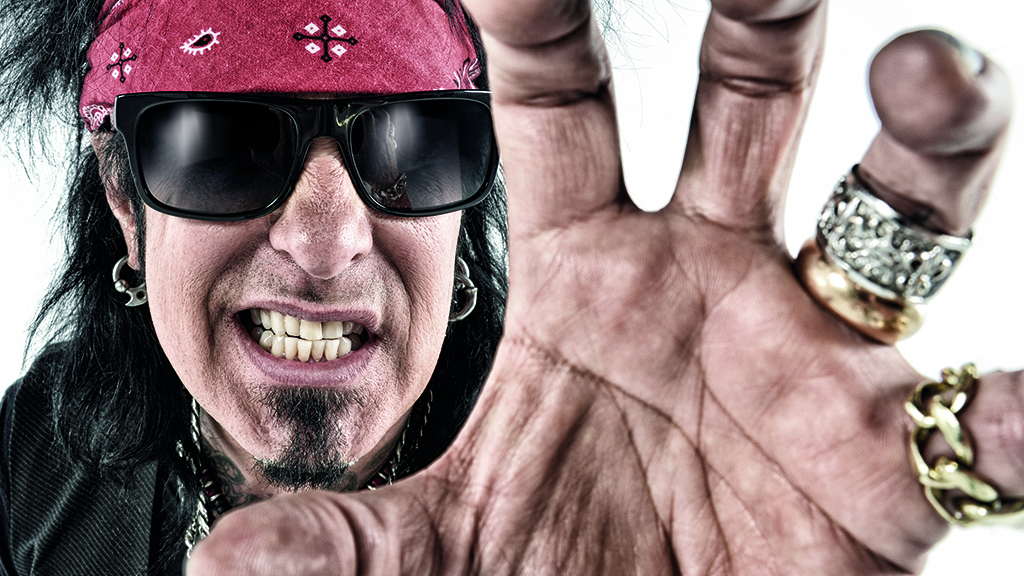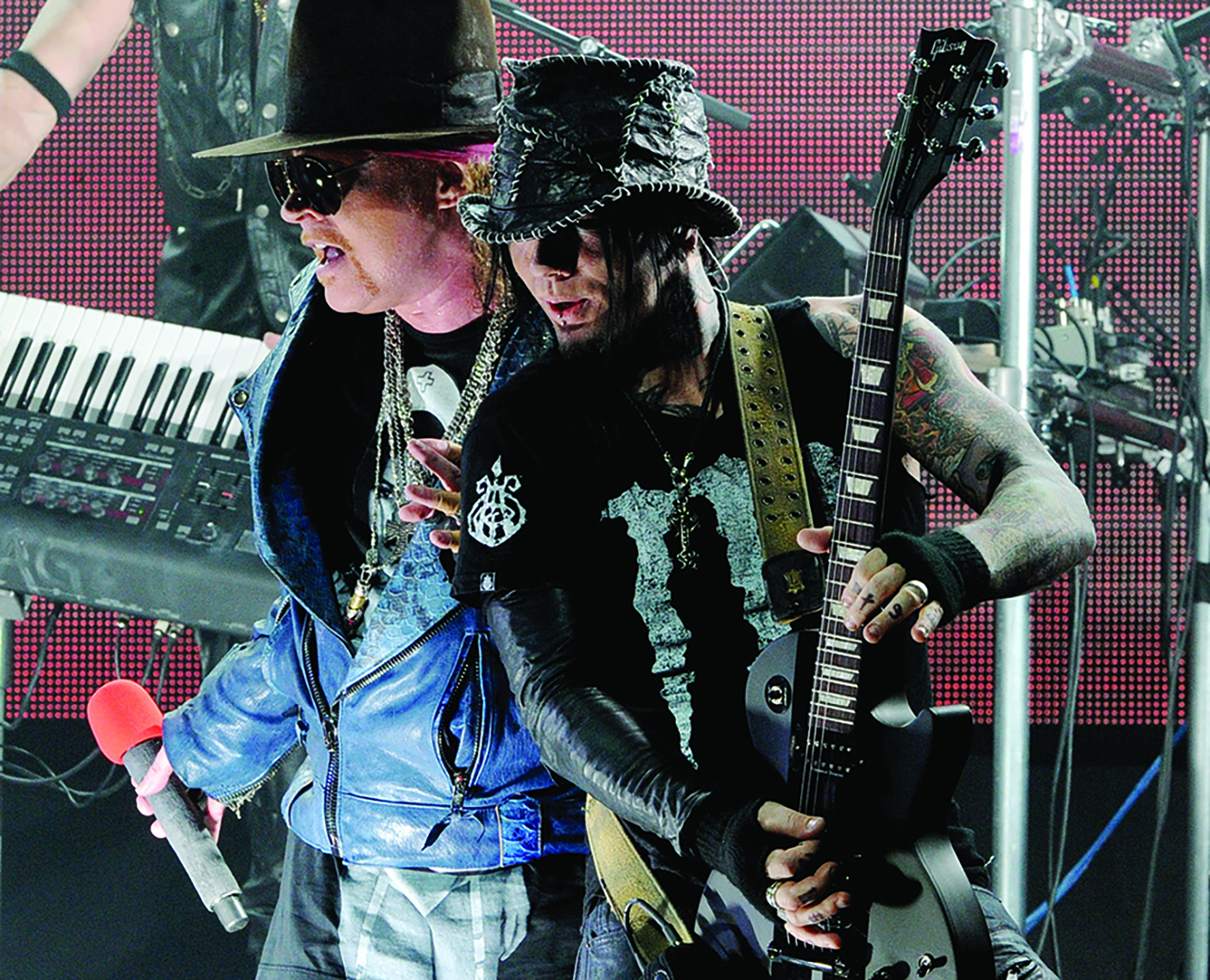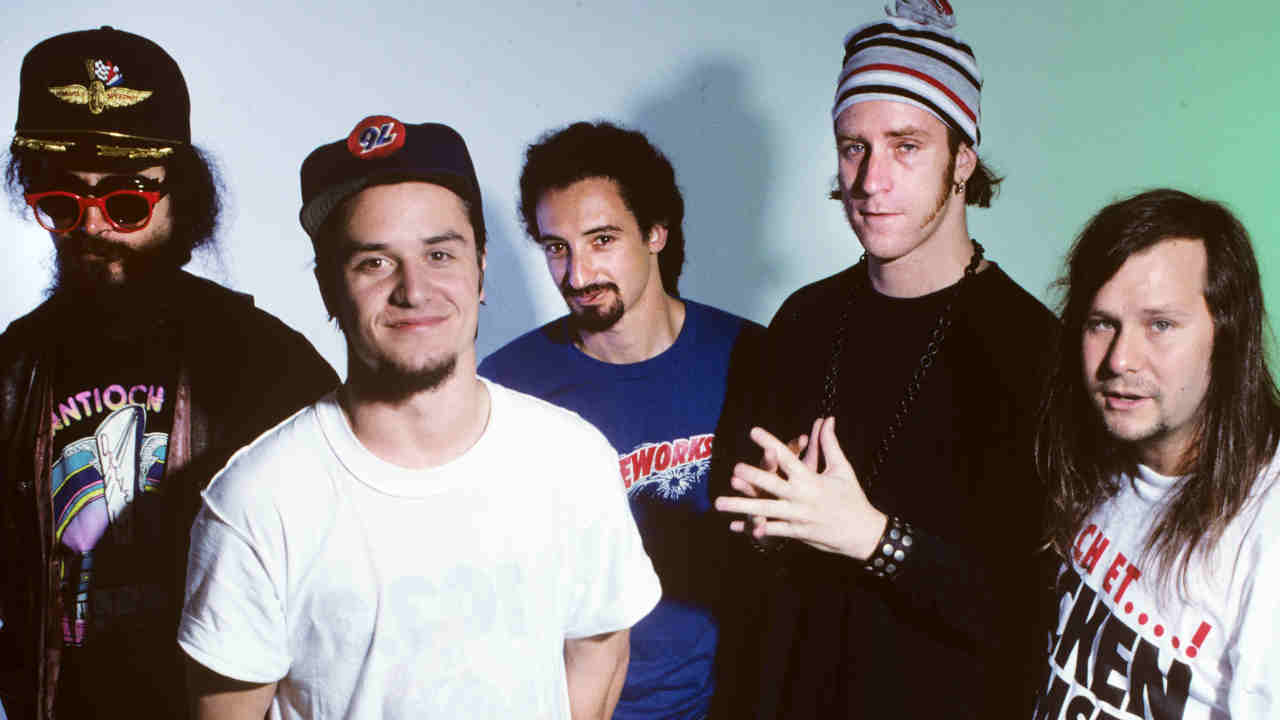Sixx AM: how Nikki Sixx dumped the “rotting carcass” of Motley Crue
Motley Crue are dead – and Nikki Sixx couldn’t be happier. It means he’s free to focus his energy on Sixx:AM - and prove once and for all that rock is far from dead

Nikki Sixx is reminiscing about his farewell to the band that has been central to his life for the last 35 years. It was the early hours of January 1, 2016, and the location was the Staples Center in downtown Los Angeles. The occasion was Motley Crue’s last-ever show – something Sixx and his bandmates had carved in stone, or at least signed a legally binding contract to say as much. As any famously respectable, law-abiding band would. In Sixx’s head, the final notes have faded, the last pyro has cracked into the sky. Thank you and good night.
“So I get off stage at the last show with Mötley at one am,” drawls the bassist, looking remarkably well given past excesses (only the line of white hairs clawing at his dyed black goatee give any clue to the fact that he’s 57), “and I fly off to Mexico with my wife the next morning at 7am. We have two weeks down there, really great, arrive back home and wife’s mom’s there – she’s been watching our dogs. I get in, refreshed, feeling great, ready for the new year.
“My mom-in-law says, ‘So how was it?’ I’m like, ‘Oh yeah, it was great, the beach was beautiful,’ and she says, ‘No, but how was it?’
“And I go, ‘Well, they had these seven restaurants in the hotel, and we didn’t even have to leave, it was gorgeous.’
“And she says, ‘Weren’t you sad?’
“And I said, ‘No! It was a beautiful vacation!’
“And she says, ‘No, your last night in Mötley Crüe!’
Sign up below to get the latest from Classic Rock, plus exclusive special offers, direct to your inbox!
“And I go, ‘Oh, I forgot about that already.’”

If Sixx is feeling any regrets at bidding farewell to his old band, he’s very good at hiding them. Instead, when we meet him in a North London photography studio, he’s larking about on a trolley with his bandmates in Sixx:A.M., guitarist DJ Ashba and singer James Michael. He’s fairly bouncing with enthusiasm at being able to focus fully, for the first time, on a new project.
Well, we say ‘new’, but Sixx:A.M. is now nearly 10 years old. The difference now is, as they prepare to release their fourth and fifth albums, nothing is in their way. Mötley who?
“That’s how my brain works,” Sixx shrugs. “I lived in the moment that night, and then I moved on, and people keep reminding me and I go, ‘Oh yeah, right.’ It doesn’t mean I don’t love the band, it just means that I’ve already said my goodbyes.”
Ask him if they left on good terms, and he simply says, “I’m still close with Vince.” He insists that he won’t be tempted into further reunions. “No, no tour, nothing, no chance of another record. I want to just leave it intact. I see no reason. We couldn’t be creative as a band, so how the hell can we continue? But I’m glad the way it finished – we did it all, we did what we said we were going to do, and now I’m excited about the future.”
That future looks far rosier than it has any right to be for a man pushing 60, who has died at least once already. This year has seen two new albums from Sixx:A.M., Prayers For The Damned Vol.1 in the spring, and its follow-up, Prayers For The Blessed, Vol.2, out now. Sixx talks about how they plan to “roll up our sleeves and make this band blow up”. DJ Ashba goes further.
“My goal is to make this band bigger than Mötley Crüe and GN’R,” says the guitarist.
Deluded? Quite possibly, but few bands ever got very far by aiming to headline their local working men’s club. Both albums certainly walk the walk, mixing the arena-ready sensibility of classic Crüe with a contemporary-sounding 21st century approach. Sure, they may look like a trio of grizzled ex-cons shortly after burrowing out of the penitentiary through a tunnel full of ink, but in the 21st century, rock’n’roll need no longer be a young man’s game. More importantly for those involved, they can finally use the ‘b’ word with a clear conscience.
“From back when we were making [Sixx:A.M.’s 2007 debut album] The Heroin Diaries, we always said, ‘We’re not a band,’” says Michael, who also works as a songwriter and producer when not with Sixx:A.M. (past clients include Meat Loaf, the Scorpions and Kelly Clarkson). “We kept saying that to ourselves, to take the pressure off, and it kind of became our inspiration to keep pushing boundaries, having no rules for the music.”
That ‘not a band’ philosophy was partly born of necessity. The Heroin Diaries was created by Sixx as a soundtrack to his autobiography of the same name, though the bassist was still very much a member of Mötley Crüe at the time. It would be another four years before Sixx:A.M. released the follow-up, This Is Gonna Hurt, by which time Ashba was a paid-up member of Guns N’ Roses (a third album, Modern Vintage, followed in 2014).

“It turned into a band by accident,” says Sixx. “After each record it was back to Mötley for me, but it was never quite what it used to be. It was only with Sixx:A.M. that I felt I found myself again. Making more artistic records, less about the sex and drugs. Not a reinvention; an evolution.”
He’s keen to stress the fact that this has far outgrown a Mötley Crüe spin-off project, repeating the words “it’s a completely different band” several times during our conversation.
“The last thing we wanna do is live off old glories,” he says. “For me, the carcass of Mötley Crüe is dead. It’s lying in the field, the flesh is rotting and I don’t wanna feed off that. I invite Mötley Crüe fans in to Sixx:A.M. but I’m not gonna poach them. Our new fans, they know about Mötley, but it’s not their band, and that’s okay.”
Did he feel a twinge of responsibility to give Crüe fans more of where that came from?
“God no! I didn’t want to be the guy sat at the Rainbow Bar & Grill: ‘Oh look! There’s Nikki Sixx! He put on eighty pounds, he just made a record that sounds like a bad version of Too Fast For Love! It’s got a girl in a bikini on the cover!’ The more I got into the Sixx:A.M. stuff, it highlights to me how, with Mötley, creatively we came to a crawl. We couldn’t write music any more. And I had one thing that I was in love with and one thing that I used to love… Well, it’s time for it to go.”
In hindsight, it’s tempting to see Sixx:A.M. as Sixx’s exit strategy from Crüe. Not so much a retirement plan as a growing-old-disgracefully plan.
“There was no plan,” he counters, “it was just about needing that creativity. I’d come away from the Mötley tour and play with these guys, and we’d be backstage writing songs, then they’d say, ‘It’s time for you to go on.’ We’d play, get off stage, get on the bus, and immediately be writing again. Dustin [Steinke, tour drummer] would be knocking out a rhythm, the girls singing harmonies, and I’d be like, ‘Man, this is my fantasy!’ And then I realise this isn’t a fantasy, I can do this! I’m not a machine, I’m a musician – all that time with Mötley, I kinda forgot!”
Meanwhile, DJ Ashba was thinking along not dissimilar lines. “I knew I’d be going back to playing with Guns, which I loved, but seeing how much our music was connecting with people, I found myself thinking, ‘Oh wow, I think I’m doing the wrong thing here,’” he says. “As much as I love Guns, at this point I think the new music I’m making deserves my full attention.”

As it turned out, the timing was fortuitous. Ashba exited Guns amicably last year, leaving the path clear for him to devote himself to Sixx:A.M. Today, he’s the very soul of diplomacy when it comes to his former employer.
“It was a tough thing because I have so much respect for Axl, and we’d become really close,” he says. “But I knew Slash was going to come back and do some stuff. And I couldn’t have been more happy about that, because ultimately I’m a fan of Guns N’ Roses, and that’s what the fans have been waiting for. So it felt like ‘my job is done here’: it was time to go focus on my creative side rather than performing someone else’s songs.”
With both Ashba and Sixx now free agents, James Michael was only too keen to reconnect with his inner rock star – something he’d put on ice after a lone solo album in 2000. “I gotta tell ya, it felt fantastic,” he gasps. “Man, I’m so glad this happened.”
All this enthusiasm is fine, but the fact remains that Sixx:A.M. aren’t Mötley or Guns: there’s a lot of slogging through mid-afternoon festival slots to come. “My promoter was asked about festivals: is Nikki going to play, like, third on the bill after headlining for so many years?” he says. “And he’s like, ‘He’ll play fifth.’ The headliners have earned that position, and this band hasn’t yet. Ultimately, we’re not even entitled to a fucking dressing room!”
So farewell, then, Mötley Crüe, and hello Sixx:A.M. Time will tell if the latter can escape the shadow of their founder’s old band, but now that Sixx is playing the music he feels reflects him more closely as an artist, how does he see Mötley’s legacy? Does he hear their influence in new music around now?
“Sure,” he says. “Maybe not influenced directly but people say, ‘I loved the way they did that, I loved how raw that kick and snare was, I love that guitar part’. And that’s a pretty cool place to be – to say, ‘Yeah, we did something that people can take a little something from and make something of their own.’”
And how does he feel today about being the godfather of hair metal?
“Well, it was a different time and unfortunately for us, a lot of bands came along and thought they were copying us, which did not only us a disservice but the fans a disservice. Ninety nine per cent of the time it was fabricated. And that’s why it got the name hair metal. For us, hair was a way of saying ‘Fuck you!’ Making it nasty and dirty and not washing our balls. Other bands were washing their balls and backcombing their fucking pubes, and having a stylist telling them how it should look. And I’m like, ‘Okay, guys, you’re definitely not shooting cocaine in your dick, so I don’t know what you’re trying to say except you’re only in it for the money.’”
Stitch that, Pretty Boy Floyd. In further proof that Sixx isn’t content to ride on Crüe’s fraying coattails anymore, he devotes much of his energy into Sixx Sense, the syndicated radio show he’s fronted since 2008, building it into one of the most influential outlets for new music out there.
“I can play any record three times a night for eight weeks in a row and get a lot of exposure for a band,” he says. “Do I get anything out of it? Materially, no, but I get everything else because I believe in new music. People say rock is dead – these people are too busy counting their interest. The pleasure of doing a radio show is being able to support new music. But when you have old rock artists saying rock is dead, what message is that to the young? When people lose contact with how they made their money, then they’re just the old guard. That’s when the king should be beheaded… Well, I have no intention of putting my head on the guillotine, I’ll keep my ear to the ground.”
And at this point, Ashba climbs up on the window outside the room where we’re talking and rubs his crotch against the glass, interrupting the highfalutin philosophising. Mötley Crüe may be dead, but normal service has been resumed.
Sixx:AM’s new album, Prayers For The Blessed, Vol.2, is out now
Johnny is a regular contributor to Prog and Classic Rock magazines, both online and in print. Johnny is a highly experienced and versatile music writer whose tastes range from prog and hard rock to R’n’B, funk, folk and blues. He has written about music professionally for 30 years, surviving the Britpop wars at the NME in the 90s (under the hard-to-shake teenage nickname Johnny Cigarettes) before branching out to newspapers such as The Guardian and The Independent and magazines such as Uncut, Record Collector and, of course, Prog and Classic Rock.

